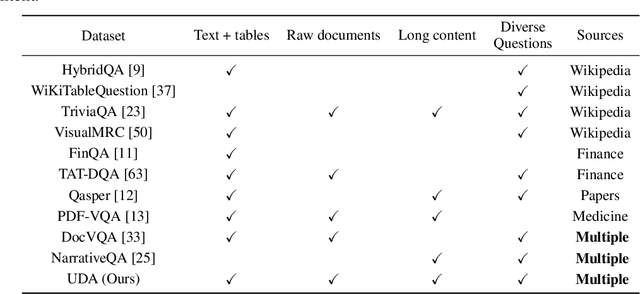Yulong Hui
Interact-RAG: Reason and Interact with the Corpus, Beyond Black-Box Retrieval
Oct 31, 2025Abstract:Retrieval-Augmented Generation (RAG) has significantly enhanced LLMs by incorporating external information. However, prevailing agentic RAG approaches are constrained by a critical limitation: they treat the retrieval process as a black-box querying operation. This confines agents' actions to query issuing, hindering its ability to tackle complex information-seeking tasks. To address this, we introduce Interact-RAG, a new paradigm that elevates the LLM agent from a passive query issuer into an active manipulator of the retrieval process. We dismantle the black-box with a Corpus Interaction Engine, equipping the agent with a set of action primitives for fine-grained control over information retrieval. To further empower the agent on the entire RAG pipeline, we first develop a reasoning-enhanced workflow, which enables both zero-shot execution and the synthesis of interaction trajectories. We then leverage this synthetic data to train a fully autonomous end-to-end agent via Supervised Fine-Tuning (SFT), followed by refinement with Reinforcement Learning (RL). Extensive experiments across six benchmarks demonstrate that Interact-RAG significantly outperforms other advanced methods, validating the efficacy of our reasoning-interaction strategy.
ScaleDoc: Scaling LLM-based Predicates over Large Document Collections
Sep 16, 2025Abstract:Predicates are foundational components in data analysis systems. However, modern workloads increasingly involve unstructured documents, which demands semantic understanding, beyond traditional value-based predicates. Given enormous documents and ad-hoc queries, while Large Language Models (LLMs) demonstrate powerful zero-shot capabilities, their high inference cost leads to unacceptable overhead. Therefore, we introduce \textsc{ScaleDoc}, a novel system that addresses this by decoupling predicate execution into an offline representation phase and an optimized online filtering phase. In the offline phase, \textsc{ScaleDoc} leverages a LLM to generate semantic representations for each document. Online, for each query, it trains a lightweight proxy model on these representations to filter the majority of documents, forwarding only the ambiguous cases to the LLM for final decision. Furthermore, \textsc{ScaleDoc} proposes two core innovations to achieve significant efficiency: (1) a contrastive-learning-based framework that trains the proxy model to generate reliable predicating decision scores; (2) an adaptive cascade mechanism that determines the effective filtering policy while meeting specific accuracy targets. Our evaluations across three datasets demonstrate that \textsc{ScaleDoc} achieves over a 2$\times$ end-to-end speedup and reduces expensive LLM invocations by up to 85\%, making large-scale semantic analysis practical and efficient.
OkraLong: A Flexible Retrieval-Augmented Framework for Long-Text Query Processing
Mar 05, 2025Abstract:Large Language Models (LLMs) encounter challenges in efficiently processing long-text queries, as seen in applications like enterprise document analysis and financial report comprehension. While conventional solutions employ long-context processing or Retrieval-Augmented Generation (RAG), they suffer from prohibitive input expenses or incomplete information. Recent advancements adopt context compression and dynamic retrieval loops, but still sacrifice critical details or incur iterative costs. To address these limitations, we propose OkraLong, a novel framework that flexibly optimizes the entire processing workflow. Unlike prior static or coarse-grained adaptive strategies, OkraLong adopts fine-grained orchestration through three synergistic components: analyzer, organizer and executor. The analyzer characterizes the task states, which guide the organizer in dynamically scheduling the workflow. The executor carries out the execution and generates the final answer. Experimental results demonstrate that OkraLong not only enhances answer accuracy but also achieves cost-effectiveness across a variety of datasets.
UDA: A Benchmark Suite for Retrieval Augmented Generation in Real-world Document Analysis
Jun 21, 2024



Abstract:The use of Retrieval-Augmented Generation (RAG) has improved Large Language Models (LLMs) in collaborating with external data, yet significant challenges exist in real-world scenarios. In areas such as academic literature and finance question answering, data are often found in raw text and tables in HTML or PDF formats, which can be lengthy and highly unstructured. In this paper, we introduce a benchmark suite, namely Unstructured Document Analysis (UDA), that involves 2,965 real-world documents and 29,590 expert-annotated Q&A pairs. We revisit popular LLM- and RAG-based solutions for document analysis and evaluate the design choices and answer qualities across multiple document domains and diverse query types. Our evaluation yields interesting findings and highlights the importance of data parsing and retrieval. We hope our benchmark can shed light and better serve real-world document analysis applications. The benchmark suite and code can be found at https://github.com/qinchuanhui/UDA-Benchmark.
Computing in the Era of Large Generative Models: From Cloud-Native to AI-Native
Jan 17, 2024

Abstract:In this paper, we investigate the intersection of large generative AI models and cloud-native computing architectures. Recent large models such as ChatGPT, while revolutionary in their capabilities, face challenges like escalating costs and demand for high-end GPUs. Drawing analogies between large-model-as-a-service (LMaaS) and cloud database-as-a-service (DBaaS), we describe an AI-native computing paradigm that harnesses the power of both cloud-native technologies (e.g., multi-tenancy and serverless computing) and advanced machine learning runtime (e.g., batched LoRA inference). These joint efforts aim to optimize costs-of-goods-sold (COGS) and improve resource accessibility. The journey of merging these two domains is just at the beginning and we hope to stimulate future research and development in this area.
 Add to Chrome
Add to Chrome Add to Firefox
Add to Firefox Add to Edge
Add to Edge